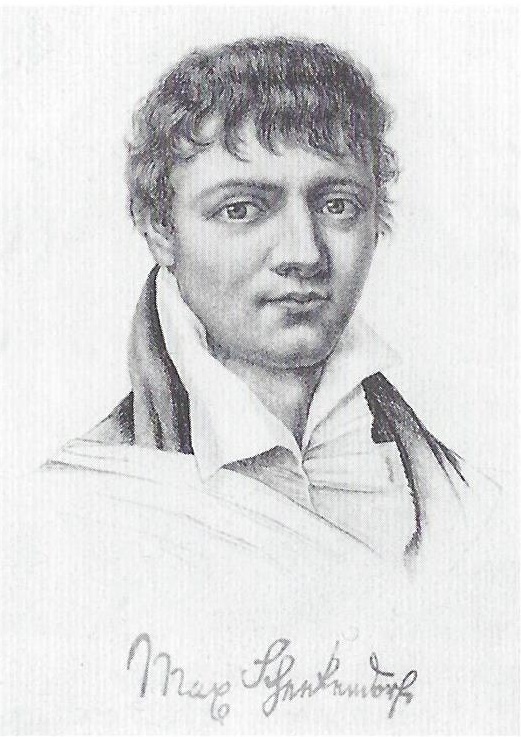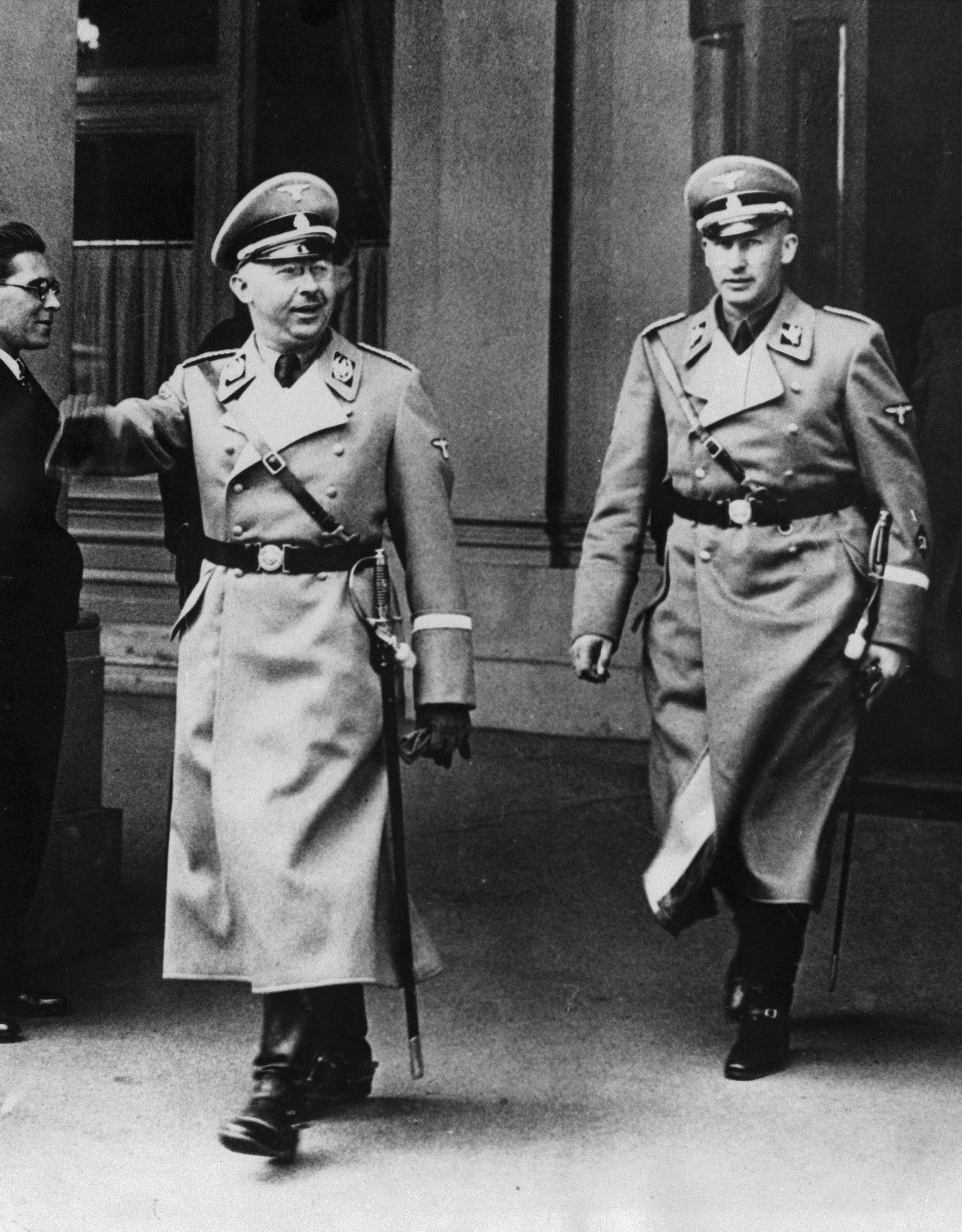|
Wenn Alle Untreu Werden
"Wenn alle untreu werden, so bleiben wir doch treu" (If all become unfaithful, we remain loyal) is the opening line of a famous patriotic German popular song written by Max von Schenkendorf in 1814. Schenkendorf dedicated the song to Friedrich Ludwig Jahn for the Holy Roman Empire. The melody was a slightly modified form of "", a French hunting song dating from 1724. The title also refers to a German hymn of the same name, written by the German poet Novalis in 1799. The first two lines of this hymn are the same as in Schenkendorf's song. Nazi and far-right use Gerhard Roßbach included the song in the activities of his German Youth Movement in which "its emphasis on loyalty in adversity and faith in Germany precisely fit Roßbach's desire to unify conservative forces behind a project of political and cultural renewal." During the Third Reich the song was used extensively by the Nazi SS, and became known as ''Treuelied'' (song of faithfulness). It sparked controversy in 2024, when ... [...More Info...] [...Related Items...] OR: [Wikipedia] [Google] [Baidu] |
Max Von Schenkendorf
Gottlob Ferdinand Maximilian Gottfried von Schenkendorf (11 December 1783 in Tilsit in East Prussia – 11 December 1817 in Koblenz) was a Germans, German poetry, poet, born in Sovetsk, Kaliningrad Oblast, Tilsit and educated at University of Königsberg, Königsberg. During the War of the Sixth Coalition, War of Liberation, in which he took an active part, Schenkendorf was associated with Ernst Moritz Arndt, Arndt and Theodor Körner (author), Körner in the writing of patriotic songs. His poems were published as ''Gedichte'' (1815), ''Poetischer Nachlass'' (1832), and ''Sämtliche Gedichte'' (1837; fifth edition, 1878). Some of his poems were set to music by lieder composer Pauline Volkstein. For his ''Life'', consult Friedrich Heinrich von der Hagen, Hagen (Berlin, 1863); Knaake (Tilsit, 1890); E. von Klein, ''M. von Schenkendorf'' (Vienna, 1908). Gallery File:Koblenz im Buga-Jahr 2011 - Rheinanlagen 25.jpg, Bust of Max von Schenkendorf in Koblenz File:Grabmal Schenkendo ... [...More Info...] [...Related Items...] OR: [Wikipedia] [Google] [Baidu] |
Friedrich Ludwig Jahn
(11August 177815October 1852) was a German gymnastics educator and nationalist whose writing is credited with the founding of the German gymnastics (Turner) movement, first realized at Volkspark Hasenheide in Berlin, the origin of modern sports clubs, as well as influencing the German Campaign of 1813, during which a coalition of German states effectively ended the occupation by Napoleon's First French Empire. His admirers know him as , roughly meaning "Father of Gymnastics ". Jahn invented the parallel bars, rings, high bar, the pommel horse and the vault horse. Life was born in the village of in Brandenburg, Prussia. He studied theology and philology from 1796 to 1802 at the universities in , , and . After the Battle of Jena–Auerstedt in 1806, he joined the Prussian army. In 1809, he went to Berlin where he became a teacher at the and at the Plamann School. Brooding upon what he saw as the humiliation of his native land by Napoleon, conceived the idea of restori ... [...More Info...] [...Related Items...] OR: [Wikipedia] [Google] [Baidu] |
Holy Roman Empire
The Holy Roman Empire, also known as the Holy Roman Empire of the German Nation after 1512, was a polity in Central and Western Europe, usually headed by the Holy Roman Emperor. It developed in the Early Middle Ages, and lasted for a millennium until its Dissolution of the Holy Roman Empire, dissolution in 1806 during the Napoleonic Wars. For most of its history the Empire comprised the entirety of the modern countries of Germany, Czechia, Austria, the Netherlands, Belgium, Switzerland, Slovenia, and Luxembourg, most of north-central Italy, and large parts of modern-day east France and west Poland. On 25 December 800, Pope Leo III crowned the Frankish king Charlemagne Roman emperor, reviving the title more than three centuries after the fall of the Western Roman Empire in 476. The title lapsed in 924, but was revived in 962 when Otto I, OttoI was crowned emperor by Pope John XII, as Charlemagne's and the Carolingian Empire's successor. From 962 until the 12th century, the empire ... [...More Info...] [...Related Items...] OR: [Wikipedia] [Google] [Baidu] |
Novalis
Georg Philipp Friedrich Freiherr von Hardenberg (2 May 1772 – 25 March 1801), pen name Novalis (; ), was a German nobility, German aristocrat and polymath, who was a poet, novelist, philosopher and Mysticism, mystic. He is regarded as an influential figure of Jena Romanticism. Novalis was born into a minor aristocratic family in Electoral Saxony. He was the second of eleven children; his early household observed a strict Pietism, Pietist faith. He studied law at the University of Jena, the University of Leipzig, and the University of Wittenberg. While at Jena, he published his first poem and befriended the playwright and fellow poet Friedrich Schiller. In Leipzig, he then met Friedrich Schlegel, becoming lifelong friends. Novalis completed his law degree in 1794 at the age of 22. He then worked as a legal assistant in Bad Tennstedt, Tennstedt immediately after graduating. There, he met Sophie von Kühn. The following year Novalis and Sophie became secretly engaged. Sophie bec ... [...More Info...] [...Related Items...] OR: [Wikipedia] [Google] [Baidu] |
Zeno
Zeno may refer to: People * Zeno (name), including a list of people and characters with the given name * Zeno (surname) Philosophers * Zeno of Elea (), philosopher, follower of Parmenides, known for his paradoxes * Zeno of Citium (333 – 264 BCE), founder of the Stoic school of philosophy * Zeno of Tarsus (3rd century BCE), Stoic philosopher * Zeno of Sidon (1st century BCE), Epicurean philosopher * Zeno of Rhodes (not later than 220 BCE), historian and politician. Other persons of antiquity * Zeno of Caunus (3rd century BCE), finance minister to the Ptolemies, whose papyri letters (the "Zenon archive") were discovered in the 20th century * Zeno (physician) (3rd and 2nd centuries BCE), Greek physician * Zeno of Cyprus (4th century), Greek physician * Zeno of Gaza (died c. 362 CE), early Christian martyr * Zeno of Verona (4th century CE), saint commemorated in the place name Basilica of San Zeno, Verona, Italy * Zeno the Hermit (4th century?) disciple of St. Basil and saint * Ze ... [...More Info...] [...Related Items...] OR: [Wikipedia] [Google] [Baidu] |
Gerhard Roßbach
Gerhard Roßbach (28 February 1893 – 30 August 1967), also spelled Rossbach, was a German '' Freikorps'' leader and nationalist political activist during the interwar period. Born in Kehrberg, Pomerania, he gained prominence for his involvement in various right-wing paramilitary groups following World War I and in particular for his close association with Hitler's impresario into the upper echelons of the demobilized Imperial German Army, Ernst Röhm. He is generally credited with inventing the brown uniforms of the Nazi Party after supplying surplus tropical khaki shirts to early troops of the ''Sturmabteilung'' (SA). Waite, who produced the early historical standard on the subject of the Freikorps movement, writes (ironically) of Roßbach that, "The true Landsknechte Freebooter'type which the National Socialists were later to extol as the possessor of 'the moral strength of the race,' is personified in Gerhard Roßbach the notorious Free Corps leader who became th ... [...More Info...] [...Related Items...] OR: [Wikipedia] [Google] [Baidu] |
Celia Applegate
Celia Stewart Applegate is professor and William R. Kenan, Jr. Professor of History and Affiliate Faculty of Musicology and Ethnomusicology at the Blair School of Music, both at Vanderbilt University. A scholar of modern German history, Professor Applegate has previously taught history at Smith College and the University of Rochester, where she served as director of the Susan B. Anthony Center for Women's Studies and held an Affiliate Faculty position in the Department of Musicology at the Eastman School of Music. Applegate received her bachelor of arts degree summa cum laude from Bryn Mawr College, majoring in history at Haverford College through the two schools' longstanding cooperative relationship. She earned her PhD in German history from Stanford University Leland Stanford Junior University, commonly referred to as Stanford University, is a Private university, private research university in Stanford, California, United States. It was founded in 1885 by railroad magn ... [...More Info...] [...Related Items...] OR: [Wikipedia] [Google] [Baidu] |
Third Reich
Nazi Germany, officially known as the German Reich and later the Greater German Reich, was the German state between 1933 and 1945, when Adolf Hitler and the Nazi Party controlled the country, transforming it into a totalitarian dictatorship. The Third Reich, meaning "Third Realm" or "Third Empire", referred to the Nazi claim that Nazi Germany was the successor to the earlier Holy Roman Empire (800–1806) and German Empire (1871–1918). The Third Reich, which the Nazis referred to as the Thousand-Year Reich, ended in May 1945, after 12 years, when the Allies defeated Germany and entered the capital, Berlin, ending World War II in Europe. After Hitler was appointed Chancellor of Germany in 1933, the Nazi Party began to eliminate political opposition and consolidate power. A 1934 German referendum confirmed Hitler as sole '' Führer'' (leader). Power was centralised in Hitler's person, and his word became the highest law. The government was not a coordinated, coopera ... [...More Info...] [...Related Items...] OR: [Wikipedia] [Google] [Baidu] |
Schutzstaffel
The ''Schutzstaffel'' (; ; SS; also stylised with SS runes as ''ᛋᛋ'') was a major paramilitary organisation under Adolf Hitler and the Nazi Party in Nazi Germany, and later throughout German-occupied Europe during World War II. It began with a small guard unit known as the ''Saal-Schutz'' ("Hall Security") made up of party volunteers to provide security for party meetings in Munich. In 1925, Heinrich Himmler joined the unit, which had by then been reformed and given its final name. Under his direction (1929–1945) it grew from a small paramilitary formation during the Weimar Republic to one of the most powerful organisations in Nazi Germany. From the time of the Nazi Party's rise to power until the regime's collapse in 1945, the SS was the foremost agency of security, mass surveillance, and state terrorism within Germany and German-occupied Europe. The two main constituent groups were the '' Allgemeine SS'' (General SS) and ''Waffen-SS'' (Armed SS). The ''Allgemeine ... [...More Info...] [...Related Items...] OR: [Wikipedia] [Google] [Baidu] |
Freedom Party Of Austria
The Freedom Party of Austria (, FPÖ) is a political party in Austria, variously described as far-right, right-wing populist, national-conservative, and Eurosceptic. It has been led by Herbert Kickl since 2021. It is the largest of five parties in the National Council, with 57 of the 183 seats, and won 28.85% of votes cast in the 2024 election and it is represented in all nine state legislatures. On a European level, the FPÖ is a founding member of the Patriots.eu (originally the Movement for a Europe of Nations and Freedom) and its six MEPs sit with the Patriots for Europe (PfE) group following the dissolution of its predecessor, Identity and Democracy (ID). The FPÖ was founded in 1956 as the successor to the short-lived Federation of Independents (VdU), representing pan-Germanists and national liberals opposed to socialism and Catholic clericalism, represented by the Social Democratic Party of Austria (SPÖ) and the Austrian People's Party (ÖVP), respectively. ... [...More Info...] [...Related Items...] OR: [Wikipedia] [Google] [Baidu] |
Allgemeines Deutsches Kommersbuch
The Allgemeines Deutsches Kommersbuch (ADK) or Lahrer Kommersbuch is the most popular commercium book in Germany Germany, officially the Federal Republic of Germany, is a country in Central Europe. It lies between the Baltic Sea and the North Sea to the north and the Alps to the south. Its sixteen States of Germany, constituent states have a total popu .... It was first published in 1858 and came up to its 166th edition in 2013. It is the German equivalent of the Flemish studentencodex. External links s:de:Allgemeines Deutsches Kommersbuch in the German Wikisource project. Commercium songs 1858 establishments in the German Confederation 1858 in music Publications established in 1858 Song books {{music-publication-stub ... [...More Info...] [...Related Items...] OR: [Wikipedia] [Google] [Baidu] |




